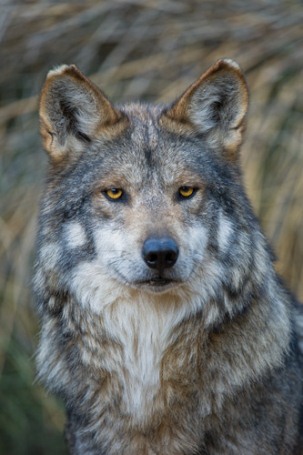28
Nov
Guest Column: Wolves, National Wildlife Refuges On The Line

If Occupy Wall Street has taught us anything, it is that certain corporate interests count on the American public to remain silent about issues we hold dear. Contrariwise, when people show their concern, it does matter.
Earlier this year I hosted a public presentation in Santa Fe by U.S. Fish and Wildlife Service employees charged with reintroduction of the Mexican gray wolf. A large crowd (mostly or entirely pro-wolf from what I could tell) listened to these dedicated field biologists talk about their work. The scientists spoke about the environmental challenges, but largely avoided discussing the political ones.
This year, however, is shaping up as a terrible one for wildlife in New Mexico and elsewhere in the West. Besides the obvious consequences of drought, the shriveled thinking of the political class has become especially noxious. Wildlife is under official attack.
The administration of Governor Susana Martinez enthusiastically endorses animal trapping that can torture, maim, and kill animals — including wolves. Her political appointees have withdrawn state efforts to cooperate with the U.S. Fish and Game Service on the wolf reintroduction project.
Meanwhile, on the federal level, Rep. Steve Pearce (Republican, New Mexico 2nd Congressional District) is a national leader in the effort to de-fund a wide range of programs that benefit wildlife. Among his targets: the Endangered Species Act, National Wildlife Refuges, and (of course) the Mexican gray wolf, a subspecies of canis lupus.
In addition to driving the Mexican gray wolf to extinction, Representative Pearce is attempting to gut the National Wildlife Refuge System (founded by Republican Theodore Roosevelt in 1903). On the chopping block are 128 refuges and under three hundred employees costing the Federal Government around 37 million dollars a year. The refuges are largely located in rural areas where their presence attracts hunters, bird watchers, and other recreationists who contribute a great deal of money to local economies.
Apparently, Mr. Pearce is opposing the refuges and protection for endangered species (including wolves) for false reasons of economy. His campaign contribution backers in big oil receive upwards of $41 billion yearly in subsidies and tax give-away plans from the federal government, more from individual states, including Gov. Martinez’ New Mexico. That is, once again, $37 million in federal dollars for wildlife refuges vs. $41 billion for big oil. (Wildlife refuges are sometimes in the way of plans for oil drilling.)
The West is large enough to allow a few wolves (currently, a total of around 50 in New Mexico and Arizona, with a larger population anticipated) and a few score refuges where migratory birds and many mammalian species can find a place simply to live. It is no longer well-remembered but before the advent of wildlife refuges and sane game hunting laws, large wild mammals in New Mexico had been nearly exterminated.
To give one example: the total elk population in our state in 1922 numbered 25 individual animals. Wolves had nothing to do with this — they too were gone except in the extreme southwestern part of the state.
Wildlife advocates have worked for generations to reverse the decline, but now, once again, our wildlife is under threat from attacks by politicians, who, misinformed, or for reasons more sinister, would reverse decades of progress.
Gov. Martinez, Rep. Pearce, and others of their ilk believe that their attacks on our natural heritage will go, if not unnoticed, then at least unopposed. But does it have to be that way?
The Taos News lists addresses of our state and federal representatives so they are easy to contact by phone, email, or through the U.S. mail.
Does the coalition of hunters, fishermen/women, outdoorsmen/women, caring land owners, environmentalists, naturalists, bird watchers, wildlife enthusiasts, etc., represent the “99 percent” that the Occupy Wall Street has brought to our attention? Maybe we are only 90 or 80 percent, but I believe we are a majority, whatever the number.
Right now, in Washington, D.C., and in Santa Fe, politicians are working to de-fund all manner of wildlife protection. If you believe in preserving our natural heritage, it is critical that you make your voice heard now.
David L. Witt, of Taos, is the author of “Ernest Thompson Seton, The Life and Legacy of an Artist and Conservationist” about the foundations of the wildlife conservation movement.
See the original article and leave comments here.
####
PLEASE SUBMIT A LETTER TO THE EDITOR CALLING ON ELECTED OFFICIALS TO OPPOSE EFFORTS TO WEAKEN PROTECTIONS OR REMOVE FUNDING FOR MEXICAN GRAY WOLVES!
Letters can be submitted to the Editor of The Taos News here.
TALKING POINTS (Please use your own words and experience-if you would like help with your letter, you can send it to info@mexicanwolves.org)
* Start by thanking the paper for publishing the Op-ed above.
* Stress that Mexican gray wolves are an important part of the Southwest’s ecosystem.
* Ask your fellow citizens to speak up in support of Mexican gray wolves.
* Encourage your elected officials to fight legislation that would strip Mexican wolves of funding and/or protections.
* Remind readers that there are only around 55 Mexican gray wolves in the wild today, making them one of north America’s most endangered animals.
* Include your connection with wolves and why the issue is important to you.
* Keep your letter shorter than 250 words.
* Provide your name, address and phone number; your address and phone number will not be published with your letter, but they are usually required for confirmation in order to have your letter published.
Thank you for all you do for Mexican gray wolves!!
Photo courtesy of Robin Silver



